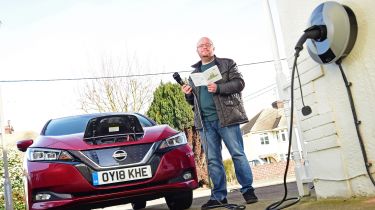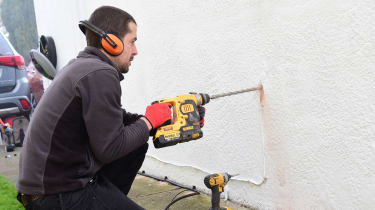Home electric car chargers: how to choose a wallbox and have it installed
If you’ve got an electric car and somewhere to park it at home, a wallbox charger is a great idea
For most people, charging an electric car at home is the most convenient way to top up an electric car’s battery. However, relying on the slowest home-based solution and plugging into a domestic socket isn’t always practical.
That’s where a dedicated home wallbox charger comes in, offering faster charging speeds and a dedicated EV charging power outlet either outside or in a garage. On-street solutions are also available in some cases.
Most wallboxes will supply alternating current (AC) at a maximum of 7.4kW; a normal three-pin plug is limited to 3kW, although car manufacturers don’t recommend using these long-term, because this can cause damage to the socket due to the high amperage drawn over a sustained period of time.
Faster (up to 22kW) three-phase set-ups are available if your home circuit will allow, but the idea of rapid direct current (DC) charging is almost exclusively reserved for public charging stations – for the time being, at least – where speeds of 50 or 100kW are common, and figures of up to 350kW are possible.
How do I choose a home electric car charger?
Most home chargers come with either a Type 1 or Type 2 cable. It’s more likely to be the latter, because these are accepted by most PHEVs and EVs sold in the UK.
Once you’ve checked the cabling will fit, it’s time to look at how fast you’d like your car to charge. Think about how you intend to use the charger, cross-referencing with the size of the battery fitted to your car. A plug-in hybrid will charge fully overnight on a 7kW charger, while some larger-battery EVs may need longer.
The higher the power, the more the unit will cost. Wallbox providers will also arrange installation, and this process is sometimes included in the price, but not always.
A series of safety checks will need to be passed before your installation gets the go-ahead, including an assessment of your mains power supply, but once complete a certified technician can usually get your wallbox set up in a few hours. From here, you’ll be able to charge your car quickly and easily at home.
How much does a home charger cost?
The average installation in the UK will cost between £800 and £1,200 for a full installed 7kW home charger. That figure can vary depending on the brand, features, installation costs, and whether you need any extras like a longer cable.
Higher-powered 11kW and 22kW three-phase setups are available, but they cost more and aren’t compatible with most UK homes unless you already have a three-phase electrical supply.
If you're eligible for the government grant, the cost can drop to around £650 to £850, thanks to a contribution of up to £350 towards the price. But remember, the grant only applies if you rent your home or live in a flat with off-street parking.
How long will a home charger installation take?
Installation is usually straightforward. Once the installer has checked your home’s wiring and confirmed the location, the job typically takes two to four hours. That includes mounting the unit, connecting it to your electricity consumer unit, and setting up any smart features.
How does the home wallbox charger installation work?
Installing a home charger is usually a straightforward process but there are a few important steps to know about before and during installation. Once you’ve picked your wallbox and booked the install, here’s what to expect.
Pre-installation checks
The installer will usually ask for photos of your consumer unit, electricity meter, and the area where you want the charger fitted. Sometimes a quick site survey might be needed to confirm your home’s electrical setup is suitable.
Delivery
Some suppliers deliver the charger before the install date, others bring it with them. The installer will confirm the best spot to mount your wallbox and check your electrics. If your home needs any upgrades such as a new consumer unit or additional wiring, this could add to the cost and installation time.
Fitting the charger
Most wallboxes are mounted on an outside wall close to your parking spot. It’s worth bearing in mind where the charging flap is located on your car to make sure you get the best location for easy charging.
The installer will drill through the wall to route the charging cable from inside your home to the outside. Cables will be run neatly either inside walls or along surface trunking depending on your property.
Wiring and safety checks
The charger is connected to your household mains using a dedicated circuit breaker for safety. The installer will run electrical tests to ensure everything is safe and complies with regulations.
Final checks and handover
When installation is complete, the installer will explain how to use your new charger and its features. You will also get a certificate confirming the installation meets electrical standards. Keep this safe for warranty or future home sales.
What home charger grants and tax breaks are available?
Government support for home charger installations still exists, but it is now limited to specific groups. The Electric Vehicle Chargepoint Grant, which replaced the broader EVHS scheme in 2022, is available only to renters and flat owners.
If you live in a flat or rent your home and have access to off-street parking, you could be eligible for a grant covering up to 75 per cent of the cost of buying and installing a charger, capped at £350. Your vehicle must be on the government’s pre-approved list of plug-in car models, and the work must be carried out by an authorised installer using an approved charger. This grant is not available to homeowners who live in houses, even if they have a driveway.
There is also a separate version of the grant for properties without off-street parking. In this case, you may qualify for the same £350 discount if your local authority approves a cross-pavement charging solution, such as a cable gully that safely connects your home to the roadside. The process varies by council and may involve planning permission or additional fees.
Currently, there are no tax breaks for private individuals installing a charger at home. However, if you drive a company car, you can claim back electricity costs for business mileage through HMRC’s advisory electricity rate, which is reviewed quarterly.
Buy a car with Auto Express. Our nationwide dealer network has some fantastic cars on offer right now with new, used and leasing deals to choose from...
Your electric car questions answered
- Should i buy an electric car?
- What’s the best way to buy an electric car?
- Is a hybrid, plug-in hybrid or electric car right for me?
- Should i buy a used electric car?
- Can i get a plug-in car grant?
- How is electric car range calculated?
- How much do electric cars cost to charge?
- How much do electric cars cost to run?
- How long do electric car batteries last?
- What happens to old electric car batteries?
- Should i get a heat pump on my electric car?
- What are fast charging and rapid charging?
- Can i tow with an electric car?
- Is wireless electric car charging the future?
- What’s the history of the electric car?








